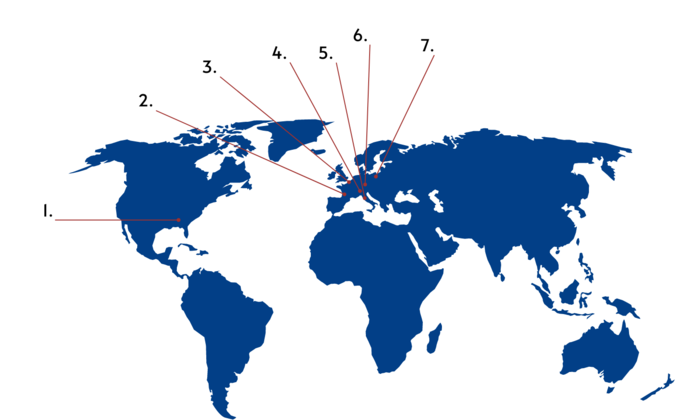Subject Area and Research Team: X. Molecular and biochemical methods for study mechanisms of civilization diseases
Research topics
1. The impact of metabolic diseases on the CNS and the role of impaired metabolism in neurodegenerative processes
2. Metabolic disease-induced impairment of repair processes in stroke
3. New applications of antidiabetic drugs: dipeptidyl peptidase 4 inhibitors (gliptins) and glucagon-like peptide 1 analogues (incretins)
Coordinators
| Coordinator #1 | Coordinator #2 | Coordinator #3 | |
|---|---|---|---|
| Name and surname |  |
 |
 |
| Academic degree | Prof. Dr. Habil. | Dr. Habil. | Dr. Habil. |
| Employment unit | Department of Immunobiology and Environmental Microbiology | Department of Biochemistry | Department of Anatomy and Neurobiology |
| Polish Platform of Medical Research | Prof. Dr. Habil. Katarzyna Zorena | Dr. Habil. Barbara Kutryb-Zając | Dr. Habil. Grażyna Lietzau |
| katarzyna.zorena@gumed.edu.pl | barbara.kutryb-zajac@gumed.edu.pl | grazyna.lietzau@gumed.edu.pl | |
| Phone number | +48 58 349 17 66 | +48 58 349 14 60 | +48 58 349 14 02 |
Research Team X. Molecular and biochemical methods for study mechanisms of civilization diseases
Team Members X. Molecular and biochemical methods for study mechanisms of civilization diseases (176 KB)Feel free to contact one of our coordinators to join our Research Team.
Key current projects
1. The role and mechanism of signal passing from HIFs 1 to 2 and 3 in human endothelium
2. The molecular mechanisms determining cell fate during UPR
3. The detection microbial metabolites short chain fatty acids in fecal and serum samples
4. The role of adenosine in calcific aortic valve disease and atherosclerosis
Key grants
| Funding agency/grant number | Title of the project | Years | |
|---|---|---|---|
| 1. | NCN/ 023/51/B/NZ4/03017 | Mitochondrial targets of flozins in endothelial cells – a new approach to the prevention, diagnosis and therapy of heart failure | 2024-2027 |
| 2. | The COST Action CA22169 EU-METAHEART | EUropean network to tackle METAbolic alterations in HEART failure | 2023-2027 |
| 3. | NCN (SONATA) 2019/35/D/NZ3/03512 | Ecto-enzymes in interactions of vascular endothelium with blood circulating cell in physiology, pathology and therapy; could cells exchange their ecto-enzymes? | 2020-2023 |
| 4. | NCN (SONATA 15) / 2019/35/D/NZ3/03512 | Ecto-enzymes in interactions of vascular endothelium with blood circulating cells in physiology, pathology and therapy; could cells exchange their ecto-enzymes? | 2020-2023 |
| 5. | NAWA (Polonium) BPN/BFR/2021/1/00027/U/00001 | Sewage sludge as agricultural fertilizer – green opportunity or hidden threat ? Study on the potential spread of antibiotic resistance through long-term land supplementation with sewage sludge | 2022-2022 |
| 6. | The Swedish Heart-Lung Foundation 20190298. Co-PI |
Stroke och typ 2 diabetes: riskmarkörer – återhämtning – reparation [Stroke and type 2 diabetes: risk markers – recovery – repair] | 2020-2021 |
| 7. | ASTRAZENECA OCH SVENSK FÖRENING FÖR DIABETOLOGI | Stroke recovery in diabetes: mechanisms and therapies based on dipeptidyl peptidase-4 inhibitors | 2019 |
| 8. | NCN / 2018/31/N/NZ9/0174 | Analysis of transcriptomic and physiological changes in leaves of Brassica napus L. after the exposure to heavy metals, with particular emphasis on the application of sewage sludge on degraded soils | 2019-2021 |
| 9. | The Ministry for Europe and Foreign Affairs (Ministère de l’Europe et des Affaires étrangères), France | Optimization of metal phytoextraction using advanced toxicological methods | 2018-2020 |
| 10. | KI Stiftelser & Fonden (Sweden) | The effects of diabetes and obesity on the olfactory system – an important link to cognitive decline? | 2018-2020 |
International cooperation
| Foreign partner (unit name) | Principal investigator(s) | Area of cooperation | |
|---|---|---|---|
| 1. | Departments: of Cell, Developmental and Integrative Biology and of Genetic, University of Alabama at Birmingham, Birmingham, USA | James Collawn David K. Crossman |
Cell biology NGS- focused bioinformatics |
| 2. | University of Lille, Sciences and Technologies Department of Biology, Laboratory of Environment, Ecology and Ecotoxicology, Villenueve d’Ascq, France |
Franck Vandenbulcke | Ecotoxicology Molecular biology including NGS and bioinformatics Field work/greenhouse experiments |
| 3. | Université de Pau et des Pays de L’Adour, E2S UPPA, CNRS, UMR IPREM 5254, Environmental Microbiology, Pau, France | Rémy Guyoneaud | Environmental microbiology – NGS, bioinformatics |
| 4. | Department of Internal Medicine II, Division of Cardiology, Medical University of Vienna, Vienna, Austria | Jolanta Siller-Matula | Thrombosis |
| 5. | University of Pavia Medical School, Pavia, Italy | Stefano De Servi | Inflammation and thrombosis |
| 6. | Department of Biology, University of Pisa, Italy | Roberto Giovannoni | Cell biology, immunofluorescence, tracking proteins |
National cooperation
| Foreign partner (unit name) | Principal investigator(s) | Area of cooperation | |
|---|---|---|---|
| 7. | Metabolomics Laboratory Clinical Research Centre, Medical University of Bialystok, Poland | Michal Ciborowski | Metabolomics |

Key publications
1. Kutryb-Zając Barbara, Kawecka Ada, Nasadiuk Khrystyna [i in.], Drugs targeting adenosine signaling pathways: a current view. Biomedicine & Pharmacotherapy, 2023, vol. 165, nr art. ID 115184, s.1-25. DOI:10.1016/j.biopha.2023.115184
2. Kutryb-Zając Barbara, Jabłońska Patrycja, Serocki Marcin [i in.], Nucleotide ecto-enzyme metabolic pattern and spatial distribution in calcific aortic valve disease: its relation to pathological changes and clinical presentation. Clinical Research in Cardiology, 2020, vol. 109, nr 2, s.137-160. DOI:10.1007/s00392-019-01495-x
3. Kutryb-Zając Barbara, Mateuszuk Lukasz, Żukowska Paulina [i in.], Increased activity of vascular adenosine deaminase in atherosclerosis and therapeutic potential of its inhibition. Cardiovascular Research, 2016, vol. 112, nr 2, s.590-605. DOI:10.1093/cvr/cvw203
4. Zorena K, Jachimowicz-Duda O, Wąż P. The cut-off value for interleukin 34 as an additional potential inflammatory biomarker for the prediction of the risk of diabetic complications. Biomarkers. 2016; 21(3): 276-82.
5. Koziński M, Ostrowska M, Adamski P, Sikora J, Sikora A, Karczmarska-Wódzka A, Marszałł MP, Boinska J, Laskowska E, Obońska E, Fabiszak T, Kubica J. Which platelet function test best reflects the in vivo plasma concentrations of ticagrelor and its active metabolite? The HARMONIC study. Thromb Haemost. 2016; 116(6): 1140-1149.
6. Iannopollo G, Ferlini M, Koziński M, Ormezzano MF, Crimi G, Lanfranchi L, Camporotondo R, Visconti LO, De Ferrari GM, De Servi S. Patient Outcomes With STEMI Caused by Aneurysmal Coronary Artery Disease and Treated With Primary PCI. J Am CollCardiol. 2017; 69(24): 3006-3007.
7. Jaskulak M, Grobelak A, Vandenbulcke F. Effects of sewage sludge supplementation on heavy metal accumulation and the expression of ABC transporters in Sinapis alba L. during assisted phytoremediation of contaminated sites. Ecotoxicology and Environmental Safety. 2020; 197: 110606.
8. Elabi O.F., Karampatsi D., Vercalsteren E., Lietzau G., Nyström T., Klein T., Darsalia V., Patrone C., Paul G. (2023) DPP-4 Inhibitor and Sulfonylurea Differentially Reverse Type 2 Diabetes-Induced Blood-Brain Barrier Leakage and Normalize Capillary Pericyte Coverage. Diabetes; Mar 1;72(3):405-414. doi: 10.2337/db22-0674;
9. Lietzau G., Magni G., Kehr J., Yoshitake T., Candeias E., Duarte A.I., Pettersson H., Skogsberg J., Abbracchio M.P., Klein T., Nyström T., Ceruti S, Darsalia V., Patrone C. (2020) Dipeptidyl peptidase-4 inhibitors and sulfonylureas prevent the progressive impairment of the nigrostriatal dopaminergic system induced by diabetes during aging. Neurobiology of Aging; May;89:12-23; DOI: 10.1016/j.neurobiolaging.2020.01.004;
10. Lietzau G., Davidsson W., Östenson CG., Chiazza F., Nathanson D., Pintana H., Skogsberg J., Klein T., Nyström T., Darsalia V., Patrone C. (2018) Type 2 diabetes impairs odour detection, olfactory memory and olfactory neuroplasticity, effects partly reversed by the DPP-4 inhibitor Linagliptin. Acta Neuropathologica Communications, Feb 23;6(1):14; DOI: 10.1186/s40478-018-0517-1.